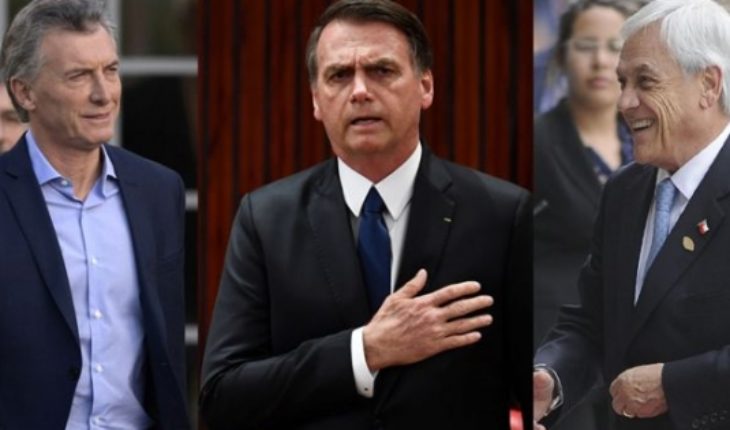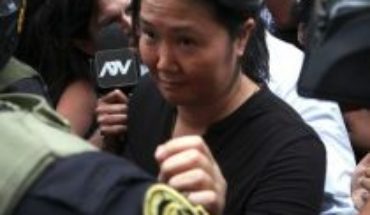It is difficult to think of a moment during the last 35 years in which Argentina, Chile and Brazil were ruled by the right at the same time.
Since the fall of the military regimes at the beginning of the 1980s, rightist presidencies in these countries more shooting Center that at the end, were exceptional and no matches in neighbouring countries.
Today, on the other hand, a democratically elected right has settled in power not only in these three countries, but also in Paraguay, Colombia and Peru.
This Tuesday, January 1, the giro will be confirmed when Jair Bolsonaro assume as President of Brazil after winning elections with a nearly unprecedented right-wing discourse in the region in recent decades.
Macri and Pinera have in common a number of links. Not the same thing happens with Bolsonaro.Por about behind the so-called “turn right” there are a number of complex phenomena, according to analysts polled by BBC world.
Progressivism, which dominated South American politics for the past 15 years, came out of power amid scandals of corruption, increased insecurity and falling economic growth.
One of the references in this wave of left, Hugo Chávez, left behind a deep economic and humanitarian crisis that disparaged the Progressivism and resulted in the exodus of at least 1.5 million Venezuelans to the region.
Another symbol of this litter, Lula da Silva, ended up in prison by a plot of corruption in Brazil, where the handling and bribes from the construction company Odebrechtse scattered throughout the region with serious political consequences in several countries.
Although many South Americans came out of poverty during the past 15 years, social mobility is not held at the time, and this new middle class generated demands that progressivism–already without the bonanza of the raw materials of beginning of century – he failed to solve.
With this, a technocratic right arose as efficient solution to the recession, insecurity, and corruption.
But as much as the South American Governments are now aligned to the right, the elements that separate them reveal are not all part of the same bag.
Although Macri and Pinera have militarized part of security, do not have, like Bolsonaro, military Cabinet. The differences “the biggest difference is their social content,” says a BBC World Gregory Weeks, specialist in Latin American studies from the University of North Carolina, in the United States.
“In Bolsonaro you see that had an impressive support from evangelicals, while Mauricio Macri and Sebastián Piñera issues such as same-sex marriage are not be challenged”.
Against their ideological profiles, Macri surprised Argentina by proposing the debate for the legalization of abortion and Piñera in Chile had no trouble to enact a law on gender identity. They are in theory developments unthinkable for Bolsonaro.
“Macri and Piñera – continues Weeks – are conservative market, but not so much socially, or unless that is not his priority. They will be Catholic, but his profile is more of conservatism that emphasizes a small State, an open economy, a floating rate control”.
“Bolsonaro, on the other hand, has a strong emphasis on the issue of social rights. It also speaks of an open and liberal economy, but it is not its focus.”
Camilo Catrillanca case was proof for critics of the Government, of which Piñera fulfilled his promise of heavy-handed. Which, believe, puts at risk the human rights. Michael Shifter, President of the center of studies inter-American dialogue, goes even beyond: “Macri and Piñera are within the parameters of normal democracy and politics, so you have to be very cautious of putting them in the same group as Bolsonaro”.
The Presidents of Chile and Argentina, both millionaire businessmen turned politicians, are considered to be members of a “new right” which is austere and conservative economically, but having some sensitivity at the social.
In both countries there were reforms and cuts in issues such as pensions and education, but not of the magnitude or with the urgency that was in the 70 and 80 years.
Bolsonaro promised cut and privatizing part of the pension system, but has said that such a reform will be difficult to pass in Congress, where he has no majority.
The subtle similarities rapprochement with the United States is seen as one of the aspects which the three leaders share, but while Bolsonaro is seen as the “tropical Trump” and his son openly supported the re-election of the American, Macri and Pinera “do more by economic pragmatism than ideological proximity”, says Shifter.
On the other hand, some found in the three Presidents a similarity in the issue of security, since all applied heavy-handed recipe to attack crime.
Even though Chile and Argentina do not suffer the high rates of killings in Brazil, Piñera and Macri have advanced measures to militarize internal security, especially for what is considered as “terrorist threats”.
The death of Santiago Maldonado is considered by some Argentines as the first sign that Macri resumed hand hard on safety. The so-called “Bullrich doctrine” is another example that use. Organizations of human rights in both countries, for example, are relationship between what happened with Camilo Catrillanca, two activists who were killed in clashes between security forces and mapuches in Chile and Argentina, and Santiago Maldonado respectively.
“Although there are aspects, security (the three leaders) don’t have the same rhetoric, which this topic is no less”, says Shifter. “Bolsonaro talks about dictators as a model and put in his Cabinet, and none of that happens with Piñera and Macri military.”
Same happens with such controversial proposals for the Brazilian as revised laws of carrying of weapons and reduce or eliminate penalties to military personnel who incur in abuse of authority.
The great similarity between the three similarities is his recipe for the economy: a liberal model that aims to shrink the State, balancing accounts by lowering spending to promote investments in partnership with the private sector job creation.
The question, according to the analysts, is how Argentina and Brazil will be able to apply a similar model to Chile, which was devised by the regime of de facto Augusto Pinochet and applied – with nuances – by democratic Governments.
Argentina and Brazil, explain, are subsidiaries of the State, with much more rooted public pension systems that will be hard to remove.
The inability of Macri install a purely liberal model in its four years of Government – takes 3 – makes it difficult to see that Bolsonaro, without a majority in Congress nor control over the budget, brings a twist to the Brazilian model.
translated from Spanish: Piñera, Macri and Bolsonaro: 3 Presidents who turned to the right the power Board in South America
January 1, 2019 |





